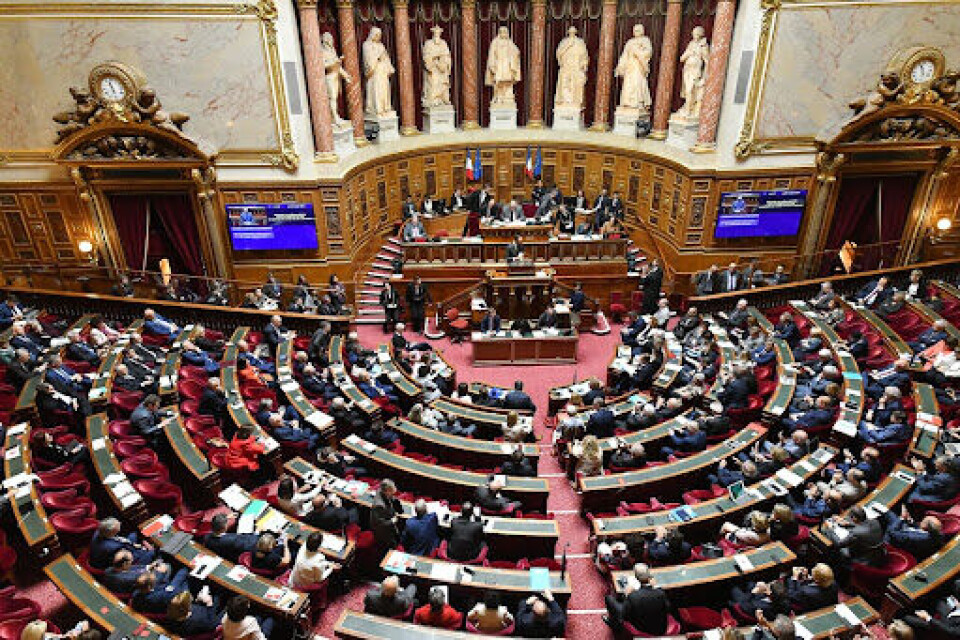-
Main points of France’s proposed 2026 budget
Higher public spending and increased tax on businesses included as overtures to Socialist Party
-
Storm set to hit north-west France
Road closures and flooding already underway in Brittany
-
Is France heading for another cold wave this month?
Predictions come amid unseasonably mild weather for much of January
French senators: their role and how next weekend’s elections will work
The French senate is an important but often overlooked institution of French politics

Hundreds of French senators are entering the final week of their campaign before the sénatoriales - France’s senate election, which is set to renew nearly half of its total composition.
A total of 170 senators across all French parties are to be nominated on September 24 as part of an election which impacts the balance of France’s legislative powers.
Under the Fifth Republic (1958 - now), the institution has sometimes been seen as ‘on the back burner’, and wrongly considered to have only slight legislative powers. It has also been criticised for the ‘slowness’ with which it makes decisions.
However, interest in the chamber has increased under President Emmanuel Macron’s second term, as MPs in the Assemblée Nationale are now split into three equally-sized political blocks, with no absolute majority.
The Senate has since emerged as an institution that can both act as an important legislative decision-maker and a way to ensure greater checks and balances on Mr Macron’s reforms. This is particularly so in light of the fact that he has to convince MPs with greater intensity than when he had a majority.
The Connexion spoke to two political experts about the Senate, including its role, its election, and the perception that people in France have of the chamber.
What is a senator’s role?
The Senate is one of the two chambers of French politics with the Assemblée Nationale (MPs).
The institution represents French regions and society, and acts as a counter-power to the legislative activities of the Assemblée. Its members participate in the voting of laws, the drafting of bills and amendments.
“The Senate is also a strong source of ideas and important reports,” said Bruno Cautrès, a political expert and member of Sciences Po political research centre CEVIPOF, who emphasised the important counter-power role of the chamber.
The Senate comprises 348 members. Since 2014 its president has been Gérard Larcher (Les Républicains; conservative right) for three consecutive terms. He was first elected president from 2008 to 2011.
How does the election work?
Senators take office for six years. Every three years, elections change the Senate’s composition, with half of the members changing each time. A total of 170 senators are elected during the first elections, and 178 during the next.
Unlike the presidential, municipal and regional elections, sénatoriales function through the universal indirect suffrage, meaning that French voters do not vote for a Senator themselves, but cast a ballot during another election for a representative who later votes during the sénatoriales.
Senators are elected by 79,000 members of an electoral college, which comprises town councillor delegates, MPs, other senators, town and regional councillors. These are known as the ‘grands électeurs.’
The college - 95% of which comprises town councilors delegates - will elect 170 senators on September 24, from candidates across 42 French mainland and overseas departments.
The number of senators elected varies by department and takes into account the population. For example, 12 senators are elected in Paris, but there are only five in the Bas-Rhin department.
Old and slow men?
Typically, people in France show little interest in the Senate.
“France’s electoral life revolves around the presidential and the legislative election,” said Mr Cautrès. “Considering that the sénatoriales are the only elections based on universal indirect suffrage, they have always been seen with mystery and distance by people in France.”
The Senate is also often seen as nothing more than ‘old men making decisions very slowly’. The French language has even turned this into an expression.
“The expression ‘un train de sénateurs’ (going ‘at senators’ speed’) characterises something that goes very slowly,” said political expert Jean Petaux.
“In an era where modernity is characterised by speed the Senate looks more like a snail’s race than a sprint,” he added.
Read also
Macron raises possibility of referendum on immigration in France
Macron: limiting president to two consecutive mandates is ‘stupidity’
























